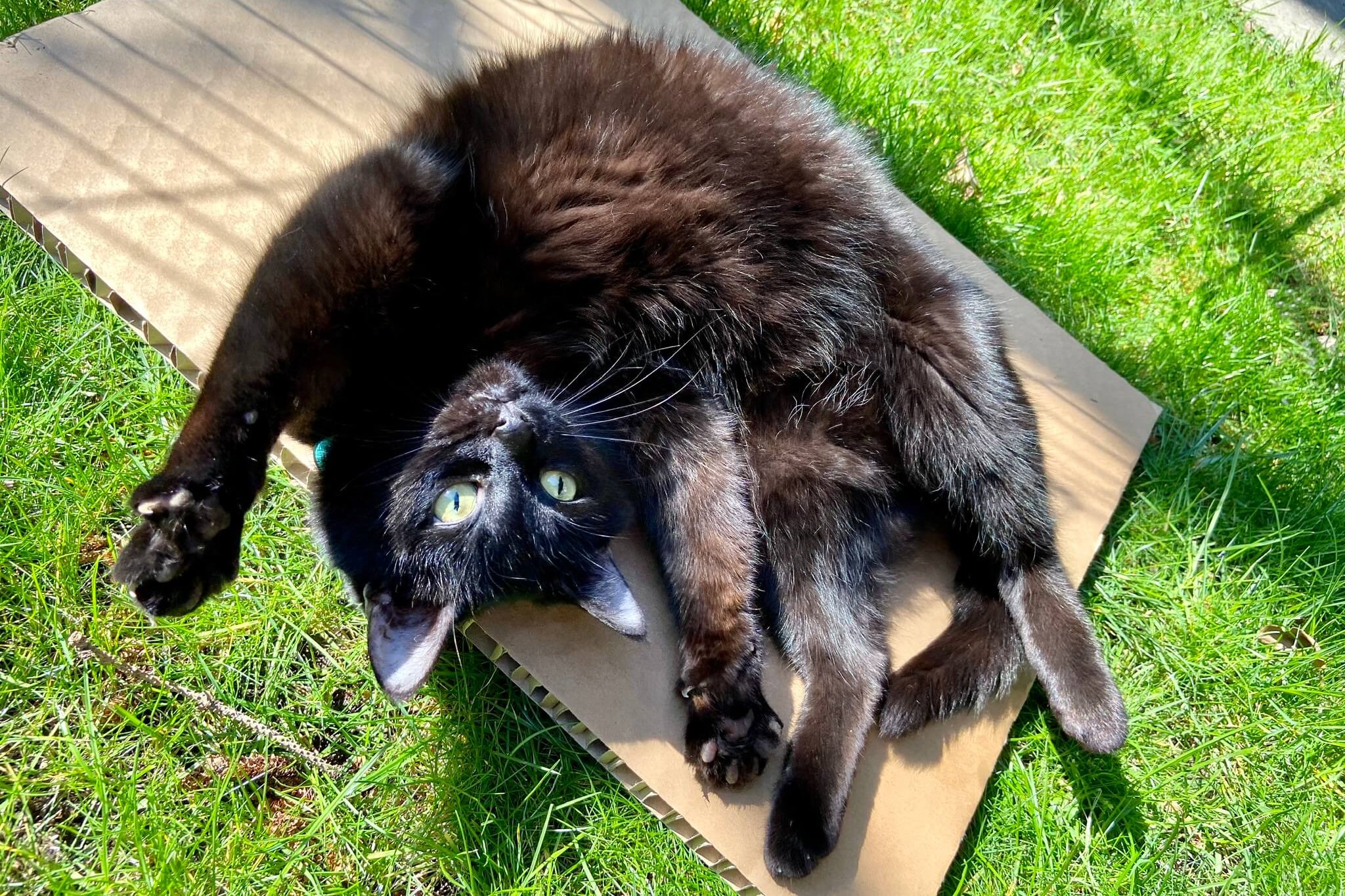
Taylor Le / Cats.com
Not a cat person? Im-paws-ible! Cats are extraordinary beings with unique personalities, needs, and preferences. Identifying your cat’s temperament can help you provide them with a superior quality of life.
Several studies have shown that cats’ personalities vary just like humans’. Some are confident, bold, and sociable. Others are timid, reserved, or fearful. Similarly, each cat behaves differently when confronted with a particular situation or event.
Let’s assess what shapes a cat’s temperament:
Feline Genetics and Environment
Your cat’s personality is influenced by their genetics and the environment they’re nurtured in. Genetics can impact how comfortable your cat is with people and other animals, how active and curious they are, and how they like to play.
The Oxytocin Receptor Gene (OXTR), which is related to a human-dog attachment, may also foretell a cat’s sociability or roughness. Domestic cats are generally approachable, less fearful, and more exploratory, while feral cats are more vigilant to danger and potential threats from people.
Kitten Socialization and Experiences
For a cat to live comfortably in your home, it’s preferable for them to experience positive interactions with people when they are a kitten. Kittens are most responsive to learning about their surroundings and their experiences can shape their response to humans for a lifetime. Likewise, kittens who have pleasant encounters with other pets are likely to get along with them more easily throughout adolescence and adulthood.
Kittens also benefit from positive exposure to a broad range of novel situations. Lack of exposure to certain sights, sounds, smells, and new people may make cats fearful of the unfamiliar. They may avoid those unfamiliar things throughout their lives by hiding away or being defensive.
Cat Personality Assessments
Cat personality assessments consider the cat’s behaviors and emotional expressions, which are constant across time and in various contexts. Temperament evaluations are usually conducted and measured across short vs. long-term observations, across distinct tests, in addition to behavioral plus personality questionnaires, and by monitoring cats during their habitual life situations to produce personality types.
So What Personality Type Does Your Cat Have?
Recent research from 200 cat parents conducted by Dr. Lauren Finka suggests cats will have one of five personality types. These five types are influenced by each of the components we discussed—genetics, environment, and developmental upbringing.
Let’s examine what personality type your cat has according to Dr. Finka’s study:
5 Feline Personality Spectrum
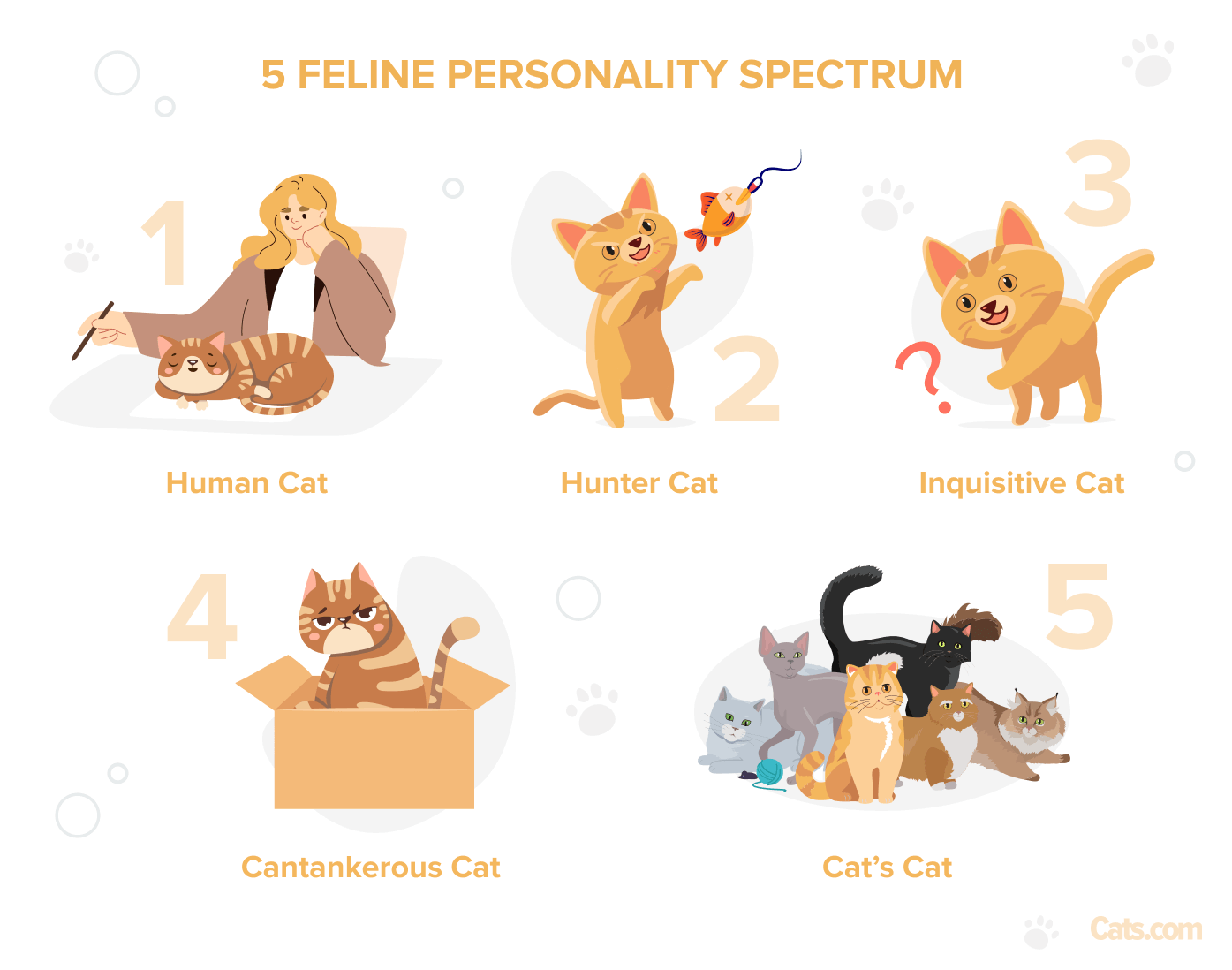
1. Human Cat
The Human Cat is sociable and enjoys affection from their pet parent. They love sharing your space with you and are always ready to cuddle or just be near you. They probably want to sleep in your bed at night and right on your keyboard during the day. This cat is incredibly friendly, calm, and responsive toward people. They display affection through kneading and will get lonely without daily social attention.
2. Inquisitive Cat
The Inquisitive Cat is eager to investigate new scents, sights, and sounds around their environment. This instinct is formed by early exposure to new stimuli during the socialization and habituation period. This cat will thrive in an energetic environment by meeting new people and being exposed to novel events and settings on regular basis. Keep them engaged with puzzle toys, foraging boxes, and cat castles.
3. Hunter Cat
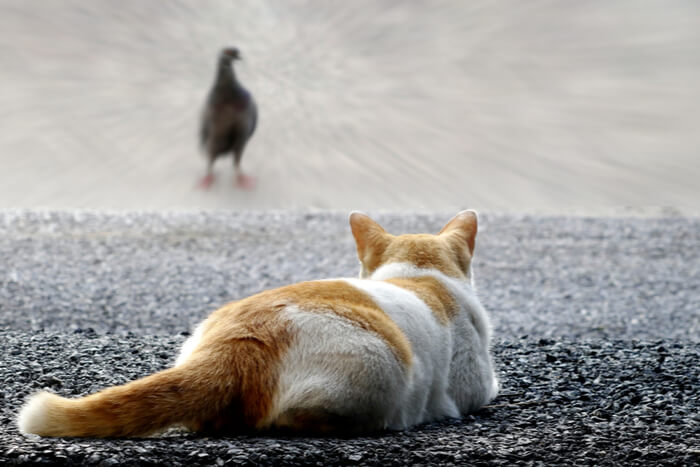
A cat may press their tail to the ground as they stalk their prey. Shutterstock.com
The Hunter Cat expresses the most predatory hunting behavior by stalking and capturing prey. Indoor-only Hunter Cats will especially enjoy “hunting” inanimate objects like mice and feather toys. They might even present you with their latest kill as a gift! Embrace this predacious behavior to prevent boredom and dissatisfaction.
4. Cantankerous Cat
The Cantankerous Cat’s love language is certainly not physical touch. They aren’t mean, they just want you to respect their space—and that’s fair! They are vulnerable to touch, hypervigilant about their environment, and easily frustrated. Be patient, keep them comfortable, and love them on their terms. They may even love to be near you—just not picked up or petted much. Provide plenty of toys for independent play and respect their boundaries.
5. Cats’ Cat
Despite being a solitary species, the Cat’s Cat enjoys sharing their home with other cats. These feline friends could be related or non-related and may even become a bonded pair. Cats like this are likely to have been socialized with other cats when they were young. They will play, groom, and cuddle their feline roommates. They might not even mind being left home alone as much because they have a valuable friend.
Each cat has a unique temperament with a genetic link. When you choose a kitten or adult cat to live closely with you, think about their individuality to make sure they’re well suited to your family and lifestyle. This will help improve the human-cat bond, decrease a cat’s frustration, and enhance their well-being.
Frequently Asked Questions
How do you describe cat personalities?
Analysis of recent research suggests cats only have five personality types although some cat parents may disagree. Three decades of research on a feline’s character have identified a multidimensional method to define cat personalities like friendliness, boldness, impulsiveness, inquisitiveness, fearfulness and more. Understanding better your cat’s temperament can assist them have the best life possible.
How do you match cat personalities to your lifestyle?
Determine if you reside a quiet, busy or noisy lifestyle with boisterous kids before adopting a kitten, likewise don’t choose a nervous, fearful kitten since it may convert into a stressed cat if your household isn’t suitable and your time poor. Lastly decide if you would like an inside only or outdoor cat that spends much time hunting and less time interacting with humans. Get the correct cat for your personal circumstances by choosing a feline companion based on its character, genetics, early encounters and behaviour rather than looks.
Is cat personality influenced by coat color?
The scientific evidence that links personality traits to a cat’s coat colour are lacking in nature. Judging a cat by its coat colour is stereotypical and detrimental to a cat’s homing prospect and welfare. Never judge a book by its cover or someone by appearance, same goes for cats!
-
Finka, L., Ward, J., Farnworth, M. J., & Mills, D. S. (2019). Owner personality and the wellbeing of their cats share parallels with the parent-child relationship. PLOS ONE, 14(2), e0211862.
-
Care, I. C. (2018, October 04). Choosing an Adult Cat. International Cat Care.
-
Isadora de Castro Travnik, D. d. (2020, August 24). Temperament in Domestic Cats: A Review of Proximate Mechanisms, Methods of Assessment, Its Effects on Human—Cat Relationships, and One Welfare. MDPI, 10, 1516.
-
Milla Salonen, K. V.-T. (2019, May 28). Breed differences of heritable behaviour traits in cats. Scientific Reports, 7949, 2-7. Retrieved August 23, 2021.
-
Salla Mikkola, M. S. (2021, July 01). Reliability and Validity of Seven Feline Behavior and Personality Traits. MDPI, 1-17. Retrieved August 22, 2021.




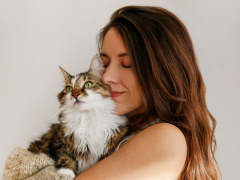


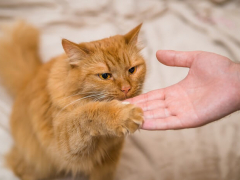
I got my cat at 11months and he acted scared frightened. Over the next 6 mo. With a lot of loving from me we have bonded and he is getting more secure but he likes biting things use lots of shoelaces toy mouse, but is this excessive biting not on me but blankets etc anything he can get his mouth on
Hi Carol,
Thank you for reading our article and for your comment.
Consider getting him some chew toys (https://cats.com/best-cat-chew-toys) and introducing him to Matatabi sticks to help reduce his tendency to bite various items.
All the best
Melina
DEFINITELY a hunter, my polydactyl kitty is deadly accurate hunting lizards. Yesterday I watched her chase a horsefly all over my house, corner it, and play with it for almost an hour!
My 6 year old grey cat is super neurotic. He hides all the time , run away from me , and is afraid of everything. Sometimes I think he needs medication for his behaviour. He cannot be happy , being like this.The other cats always bully him , but sometimes he will be the bully. He likes to be close to me though , and try to suckle in my neck , with vigorous kneading.
Hi Rene
Thank you for sharing your feedback.
It might be worth consulting with a veterinarian and requesting a referral to a Behavioral Vet or a Certified Cat Behaviorist, to help with your fearful cat.
All the best,
Melina
I have had Bobbie since a baby. She is now about 8 months old. How do I keep her from jumping on the kitchen counter and second how do I keep he from attacking my feet and biting?
Hi Patricia
To prevent Bobbie from jumping on the kitchen counter, you can try some of the following tips available at https://cats.com/how-to-keep-cats-off-counters:
To stop Bobbie from attacking your feet and biting, you can follow these steps:
1. Increase your cat’s daily interactive playtime.
2. Introduce puzzle feeders to keep Bobbie mentally stimulated.
3. Use a loud ‘ouch’ to discourage biting.
4. Ignore your cat and avoid petting during an attack.
5. Redirect your cat’s attention before an imminent attack.
Moreover, this month, keep an eye out for our highly anticipated upcoming article about kitten biting, which will provide you with even more valuable tips.
All the best,
Melina
All cats are certainly different, I have adopted a part feral man, Zucchini and I have been together for about 3 years now, He is a tuxedo. He also, still hides from anyone who enters the house, my partner and him have a love hate relationship. We have bought him several beds, which he does not use, toys, tunnels, boxes and towers he’s not interested in. Does play with the furry mice, they are everywhere. It has been interesting trying to find a food he would eat both dry and wet (which he looks at but doesn’t eat.) About a week ago, he has allowed me to brush and pet him. Always on his terms. Zucchini will never be a lap cat. And I can accept that. He follows me around the house like a puppy. Love him dearly. I have never heard him meow. Like now as I work on the computer he is under my desk sleeping.
I realize this terrific article was written awhile ago; however, I wanted to share some thoughts.
I disagree with the notion there are only five feline personality types. Their personalities differ as much as any animal, bird or reptile.
I take care of ferals and have four rescues right now. Three of my other rescues passed away. All have significantly different personalities, attitudes and characteristics. None fit those 5 as described above.
Cats continuously amaze and fascinate me to no end. (Then again, all God’s creatures do.)
Love this site and your newsletters 💕ðŸ™ðŸ¾
I have a 12 yr old Calico. Had her since bout 6-8 wks. old.She’s never been mistreated. Her mom was a Ferral. She just isn’t friendly to other peop[le and goes and hides. She does let me scratch her butt. Don’t like being held either. She recently started to jump up on the bed and let me rub her belly. But when she has had enough she’ll either bite me or scratch me. It draw’s blood. I talk to her all the time. She won’t play with any toy’s either. She sleep’s in the spare B/R all day under the desk. If door closed, she Meow’s for me to open it.Has several cat bed’s seldom use’s. She alway’s has water, food, available. I feed her Pate in the morn and then again late afternoon.Alway’s Dry Food available. She’s never been sick. When I groom her, she let’s me, for a little while. Then out of the blue she’ll try to bite or claw me and leave’s. Love her to death, but just put up with her disposition. I think it’s the Ferral built in her. Just a guess. I WILL NOT get rid of her
Thank you Russ for reading our article and sharing your journey with your Calico girl.
It’s likely her mum may have been stressed during the gestation period hence her timid personality, please continue loving her to death.
Best wishes
Melina
Russ,
I have a gray Manx that my daughter rescued and brought to me. He was feral and about 9 weeks old. Since I am retired and have the time to research and try things, I will pass along what worked for me and Alex. He has many of the same characteristics of your Calico Girl, our guests never see him, he used to hide away most of the day, he does not like to be picked up.
Are you familiar with the slow blink? Next time your Calico Cutie is relaxed and looking straight at you, very slowly and deliberately blink in a slow way just once. Relax your eyes as if you are about to fall asleep, sort of a limp half closed. See what she does. If she is still looking or starts responding by slow blinking back to you, do it again. Cats communicate with each other with their eyes. This is how they communicate love and trust.
Check out Jackson Galaxy’s site, he studies cat behavior and psychology.
Since meowing is a cat’s way to communicate with humans, not cats, if she meows, you should always answer her if possible. When Alex found out he could call me, he began jumping into my lap and spending afternoons with me.
Next time she jumps on your bed, stroke her very gently everywhere except her stomach. Most cats hate that. Watch her reactions and she will let you know which areas she likes you to stroke most. Brushing and grooming is great!! Move around, though, the area on top of their butt can get over stimulated and irritated quickly.
I hope you and your Calico Girl love your journey as much as Alex and I are loving ours. Cats are amazing complicated creatures and I thank my Heavenly Father every day for creating them.
I have 2 Siamese mix kittens that are 10 months old. They are littermates and a bonded pair. But individually they are the humans cat and the inquisitive cat. Both bearing traits of each category. They love human attention, are into everything and are sociable in general. Having them together also works out as they have each other for company when I’m not home. Both my girls love sleeping with me at night. And one of them has an obsession with my hair ties. They are my world.
I have the weirdest cat. she will not play with store bought toys. and when i play with her on the floor she has a blast. she runs through the house and then comes and attacks me. if i use my hands she will bite me. she doesn,t bite hard only if i play a little rough. i think this is normal. I have spent all kinds of money on cat toys but butt she just looks up at me as if to say, are you stupid dad this is fake. i have bought toys thyat take batteries but that only last about two or three minutes and she is bored with it and never touches it again. any sugestions.
Hi Michael,
Every cat has an individual preference and taste (like humans). My female cat doesn’t play with any toys and gets bored easily. Cats like novelty, so first I suggest playing with a toy/object for few days, then hide it in the draw for about a week prior to bringing it. To eliminate her biting your hands, don’t use small toys/objects to play with her, she might be confusing your hand with the end of the toy or thinking it’s ‘prey’. You can make your own ‘toys’ with objects like pasta shells, rolled up socks or scrunched aluminium foil, just use whatever texture she likes. You can also add puzzle feeders to stimulate her mind. You can read more about How To Safely Play With A Cat here; https://cats.com/how-to-play-with-your-cat.
Hope this helps a little
Melina
Good luck with you cat .I have a question I have had my male cat for almost a year. I had a dog who I had way before My cat TomTom My dog passed TomTom was a bit aggressive with my dog but loving as well No it’s me and TomTom I adore him yet He attacks my lower legs it’s like he is in hunting mode this hurts my legs I can’t always deal with this aggression some time he will do the same to my wrists what can I do I play with him he is spoiled Where do I turn I miss my dogs So much the past year 2 dogs passed I got TomTom and his brother George who I found a home for and both cats display the same issues idk really how George is living or how he is treated But TomTom is my man and he knows it he is a cat dog every where I Go He is Help
Hi Theresa
I am sorry to hear about your dog’s passing and lower leg attacks by your cat.
Cats attack feet for many different reasons. Play, boredom, the thrill of the hunt and attention-seeking behaviour are the main reasons. Refer to this article written by Dr Chandley for further information on why and how to get your cat to stop attacking your feet: https://cats.com/why-does-my-cat-attack-my-feet.
I hope you find this helpful.
All the best,
Melina